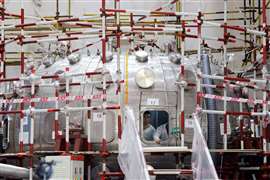Credit shocks
10 April 2008
According to Samuel Zell, US real estate billionaire, “We're not really in a ‘credit crunch.' I think we're in a ‘confidence crunch,” He argues that the large liquidity in the financial markets that existed eight weeks ago still exist today, although with a different risk premium.
The events of the last two months in world financial markets are causing great concern. It all started with a crisis among US sub-prime mortgage lenders, then spread to US banks and hedge funds and then to UK and other multinational banks, sending a chill down bankers' spines all over the world.
More important perhaps is the slowdown, which had already started, in US domestic new housing starts. According to the US Department of Commerce, construction starts for new houses in August 2007 were the slowest for 12 years. Caterpillar said in a 19 October press release, “Through the first nine months of this year, (US) housing starts were down 26%.”
Fleet investment
It's easy to imagine US rental companies postponing fleet additions for perhaps a year. Manufacturers risk being hit by a slowdown in orders at the same time as banks tighten credit. Rental companies can maintain flat financial performance without adding hire fleet, but order slowdowns could cause catastrophes for suppliers.
“It's easy to imagine US rental companies postponing fleet additions for perhaps a year.”
What does the current credit ‘crisis' mean for access manufacturers and the rental industry? AI's financial analyst, JEFF EISENBERG, provides an overview.
This may not be all bad news for rental companies in economies outside the US. In fact, overcapacity of US manufacturers would transform the world market for self-propelled access equipment into a buyer's market for the first time since the early 2000s.
Rental companies seeking loaned money to build fleets should expect banks to continue lending, although very selectively. The current situation is an opportunity for banks to raise interest rates. A warning bell should be ringing for highly leveraged rental companies, which could well see the cost of borrowing rise.
Banks are saying they will still lend, although perhaps not at the same cash flow multiples as earlier in the year, and venture capitalists still have money to invest. All things being equal, however, the more timid the banks, the less a venture capitalist can pay for a company and still make the same return. Consequently, company valuations go down. As a result, investors who already own companies postpone selling, waiting until things turn around.
Larger deals will suffer more, as banks are having particular trouble syndicating large debt, a process by which larger loans are effectively sold in slices to other banks and investors. The US markets for syndicated loans are down a full 36% from the second quarter to the third quarter of 2007; leveraged loans with lower credit ratings are down 46%.
If your company is owned by a venture capitalist, expect that your owner may postpone selling you, but expect also that it will demand ever more vigilance on cash management and also restrict investment. This is equally true for manufacturers and rental companies; everyone will be more cautious with cash.
Lessons from the past
However, drawing a lesson from the beginning of the decade, a downturn provides opportunities for cheap acquisitions of good companies. Remember, Linamar bought 48.5% of Skyjack for €15 million in 2001, a company which made a €41 million profit in 2006 on sales of almost €260 million.
Perhaps the most frustrating thing about the current moment is uncertainty. Will things get worse due to some other shock to the financial system? This uncertainty makes it easy to postpone decisions, especially decisions made by investors and risk-averse bankers.
In conclusion, today's perceived credit crisis could get better, or worse, depending on any new shocks or spreading effects within the financial system. I expect things to be quiet for a few months or so. The most likely outcome is that credit will become a bit tighter than it was, but available at a higher price as supply and demand reach balance. Investors will still invest, but they will negotiate hard on price and be very careful.






